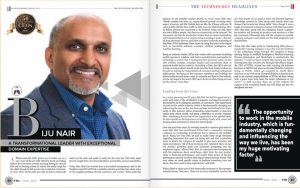Vegetable growing in a hydroponic culture unit; NGEN has supported companies developing similar techniques. Photograph courtesy of The Guardian and Kiyoshi Ota/EPA.
NGEN was one of many venture-capital companies that rode the wave of clean-tech investing that started in the early 2000s. The firm invested primarily in energy and materials companies, such as solar companies with novel methods for converting light into electricity.
But by the late 2000s, it became clear that politicians in Washington DC were unable to pass a national energy policy – and that some clean-energy technologies didn’t mesh well with the venture-capital model. The principals at NGEN knew it was time to shift gears: clean tech was out, environmental sustainability and personal health were in.
“We were putting our experience in sustainability, energy efficiency, and smarter use of resources and materials to work, but we were just looking at economically driven business models, not one dependent on regulations,” says Rosemary Ripley, a managing director at NGEN.
One of the first startups it funded with its new investment filter was eRecyclingCorps, which takes used mobile phones at carriers’ retail stores and then resells or recycles them. It’s also targeting sustainability-minded consumers with health and wellness products.
Last month, the company invested $6.5m in Enzymedica, which makes enzyme supplements designed to aid digestion. That deal follows investments in three health food companies this year, including one that delivers healthy lunches to children at schools.
NGEN also has backed companies that make hydroponic greenhouse farms at supermarkets, enzyme-based dietary supplements, healthy snack foods, and a vegan restaurant chain.
It’s not alone. While some clean tech VCs have migrated back to software and the internet, or turned their attention to less capital-intensive clean-tech ventures, such as those that enable crowdfunding for solar or make software for energy-efficient buildings, others, like NGEN, are transitioning from clean energy to sustainability.
Shifting to sustainability
The Westly Group, for instance, previously invested in electric-vehicle maker Tesla Motors, as well as smart grid and biofuels companies. But among its more recent investments is a very different kind of company: Revolution Foods, which brings healthy lunches to children in schools. “Some people question whether Revolution Foods is really clean tech, but they are changing the world,” managing partner Steve Westly told the Oakland Tribune.
DBL Investors also invested largely in clean-energy companies in its first fund, but its portfolio now has a number of sustainable products and services, such as ways to purchase organic food at wholesale prices and packaging made from recycled paper material. Similarly, Khosla Ventures has a broad sustainability portfolio that includes agriculture and water along with renewable energy and efficiency.
The shift has slowed the pace of experimentation in some areas, such as solar manufacturing or biofuels. But areas that traditionally have not garnered much attention from venture capitalists, such as food and water, are attracting more capital.
“What you’re dealing with in both cases is that there are very clear macro-trends: There needs to be more food, water and energy and we need to produce it in less resource-intensive ways,” says Rob Day, a partner at Black Coral Capital and clean-tech venture capital expert. “I think there’s a lot of opportunity to reinvent channels and marketplaces – the overall solution – using existing technologies.”
The verdict is still out on whether venture capitalists will be more successful in sustainability, writ large, than clean tech, Day says. But more funding in sustainability-oriented startups could benefit large corporations and bring more innovative products and services to consumers.
Will sustainability prove more lucrative than clean tech?
Large corporations can offer products from new firms as part of their employee health and wellness programs and gain insight into the types of products that resonate with consumers. Meanwhile, smaller companies have more freedom to gamble with new types of products or business models, says Peter Grubstein, managing partner at NGEN.
“We’re seeing opportunities to work with large strategic corporate partners,” Grubstein says. “A large portion of industry has cut back on research and development so they look at young companies as a source of innovation.”
Companies that make products for health or sustainability-minded consumers fit the venture-capital-investment model better than some energy companies, Grubstein claims. Rather than have to invent something from scratch, companies making food or health products often need funding to build sales channels to consumers. “We’re not taking pure technology risk. We are taking the risk of building markets,” he says.
And compared to energy, consumer products don’t necessarily take years to commercialize, yet can still have substantial global benefits. For example, coming up with delicious alternatives to meat can have a big impact on unsustainable agricultural practices, like many currently performed, Ripley says. These types of products also send a message to consumers, which large businesses should pay attention to.
“The notion that there’s an interesting business where you can do well and do good at the same time is pretty inspiring, especially to many millennials,” Ripley says. “It’s raising awareness that there are small steps we can all be doing.”
Martin LaMonica is a Boston-based reporter covering energy, technology, business and the environment. Follow him @mlamonica




